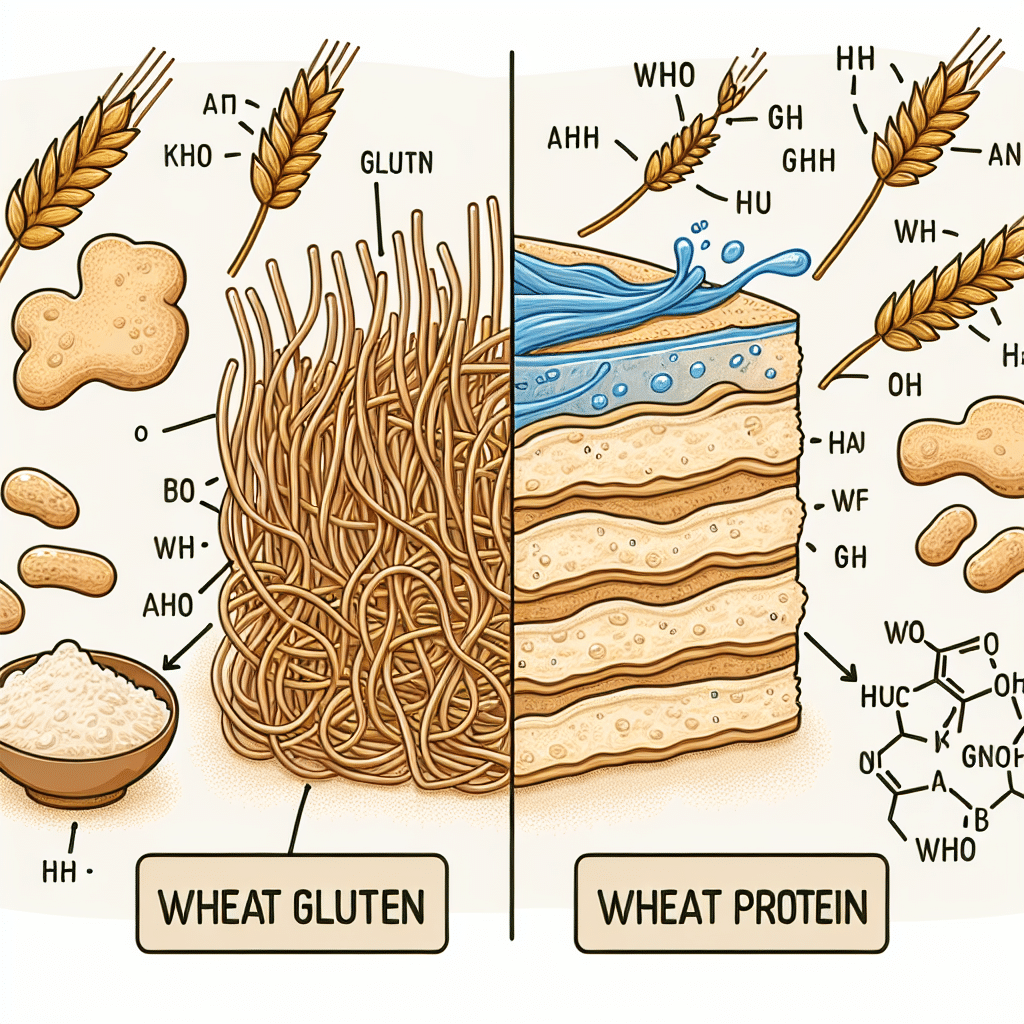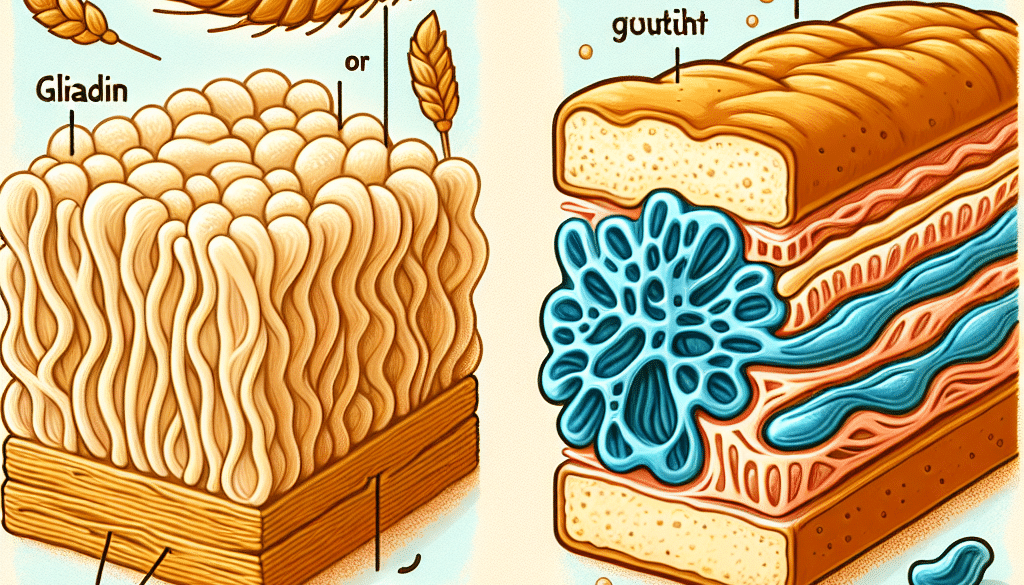What Is The Difference Between Wheat Gluten And Wheat Protein? Deep dive
Table of Contents
- Understanding the Difference Between Wheat Gluten and Wheat Protein
- What is Wheat Protein?
- What is Wheat Gluten?
- Comparison of Wheat Gluten and Wheat Protein
- Nutritional Value and Health Considerations
- Uses of Wheat Gluten and Wheat Protein in Food Production
- Case Studies and Statistics
- Conclusion: Key Takeaways
- Discover ETprotein’s High-Quality Protein Products
Understanding the Difference Between Wheat Gluten and Wheat Protein

Wheat is a staple food for many cultures around the world, and its derivatives, such as wheat gluten and wheat protein, are widely used in various food products. However, there is often confusion about what these terms mean and how they differ from each other. This article aims to clarify the distinction between wheat gluten and wheat protein, providing valuable insights into their unique properties, uses, and nutritional aspects.
What is Wheat Protein?
Wheat protein is a general term that refers to the composite of proteins found in wheat. These proteins play a crucial role in the growth and development of the wheat plant. When wheat flour is mixed with water, the proteins gliadin and glutenin within the flour interact to form a complex protein known as gluten. Therefore, wheat protein is a broader category that includes various individual proteins, including gluten.
- Gliadin: Contributes to the extensibility and stickiness of the dough.
- Glutenin: Responsible for the elasticity and strength of the dough.
What is Wheat Gluten?
Wheat gluten, often simply called gluten, is the specific protein network that forms when wheat flour is mixed with water. This network gives dough its elasticity and allows it to rise when baked. Gluten is what makes wheat-based products like bread and pasta chewy and gives them their structure.
Gluten is not only found in wheat but also in other grains such as barley and rye. It is the triggering factor for individuals with celiac disease or gluten sensitivity, as their bodies react negatively to this protein, leading to various health issues.
Comparison of Wheat Gluten and Wheat Protein
While wheat gluten is a type of wheat protein, not all wheat proteins are gluten. The difference lies in their composition and functionality:
- Composition: Wheat protein includes a range of proteins, whereas gluten is a specific protein complex formed by the combination of gliadin and glutenin.
- Functionality: Gluten provides the unique texture and properties to wheat-based products that cannot be replicated by other wheat proteins.
Nutritional Value and Health Considerations
Both wheat gluten and wheat protein contribute to the nutritional profile of wheat-based products. They are rich in protein, which is essential for muscle repair and growth. However, for individuals with gluten-related disorders, consuming gluten can lead to health complications.
- Wheat Protein: Contains a balance of essential amino acids, making it a valuable protein source in diets.
- Wheat Gluten: While also protein-rich, it lacks some essential amino acids and is not suitable for those with gluten intolerance or celiac disease.
Uses of Wheat Gluten and Wheat Protein in Food Production
Wheat gluten and wheat protein have distinct uses in the food industry due to their different properties:
- Wheat Protein: Used as a general ingredient to enhance the protein content of foods.
- Wheat Gluten: Specifically utilized to improve the texture and volume of baked goods. It is also the main ingredient in seitan, a popular meat substitute.
Case Studies and Statistics
Several studies have highlighted the importance of wheat protein and gluten in food production:
- A study on the bread-making quality of wheat flour showed that the quantity and quality of gluten directly affect the loaf volume and texture of bread.
- Statistics indicate that the global wheat protein market is growing, with an increasing demand for plant-based proteins.
Conclusion: Key Takeaways
In summary, wheat protein is a broad term encompassing all proteins in wheat, while wheat gluten is a specific protein complex that gives wheat-based products their unique properties. Understanding the difference between these two is crucial for both consumers and food producers, especially when considering dietary restrictions and nutritional goals.
Discover ETprotein’s High-Quality Protein Products
If you’re looking for premium protein products, ETprotein offers a wide range of organic bulk vegan proteins that cater to various industries. Their products are characterized by a neutral taste, non-GMO, and allergen-free attributes, ensuring you receive the highest quality proteins for your needs.
About ETprotein:
ETprotein, a reputable protein and L-(+)-Ergothioneine (EGT) Chinese factory manufacturer and supplier, is renowned for producing, stocking, exporting, and delivering the highest quality organic bulk vegan proteins and L-(+)-Ergothioneine. They include Organic rice protein, clear rice protein, pea protein, clear pea protein, watermelon seed protein, pumpkin seed protein, sunflower seed protein, mung bean protein, peanut protein, and L-(+)-Ergothioneine EGT Pharmaceutical grade, L-(+)-Ergothioneine EGT food grade, L-(+)-Ergothioneine EGT cosmetic grade, L-(+)-Ergothioneine EGT reference grade and L-(+)-Ergothioneine EGT standard. Their offerings, characterized by a neutral taste, non-GMO, allergen-free attributes, with L-(+)-Ergothioneine purity over 98%, 99%, cater to a diverse range of industries. They serve nutraceutical, pharmaceutical, cosmeceutical, veterinary, as well as food and beverage finished product distributors, traders, and manufacturers across Europe, USA, Canada, Australia, Thailand, Japan, Korea, Brazil, and Chile, among others. ETprotein specialization includes exporting and delivering tailor-made protein powder and finished nutritional supplements. Their extensive product range covers sectors like Food and Beverage, Sports Nutrition, Weight Management, Dietary Supplements, Health and Wellness Products, and Infant Formula, ensuring comprehensive solutions to meet all your protein needs. As a trusted company by leading global food and beverage brands and Fortune 500 companies, ETprotein reinforces China’s reputation in the global arena. For more information or to sample their products, please contact them and email sales(at)ETprotein.com today.














